23 start with I start with I
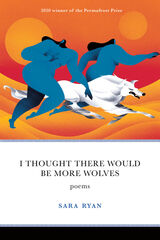
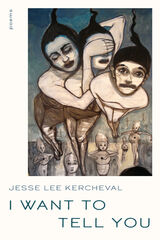
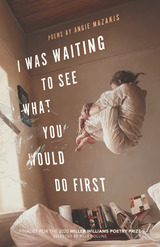
Like nesting dolls, the poems in I Was Waiting to See What You Would Do First contain scenes within scenes, inviting the reader over and over again to sharpen focus on minute details that, though small, reveal much about human perception and imagination.
Angie Mazakis handles these layers of revelation with great tenderness. Her poems wander in the way that a curious mind wanders, so that even though they often end very far from where they started, they are anchored in the familiar, referring to experiences we all share: a moment of distraction in a coffee shop imagining a conversation with someone across the room, or a narrative built around the expressions of the cartoon people on the airplane seatback safety guide.
I Was Waiting to See What You Would Do First is a testament to the notion that whether through a cosmic or microscopic lens, “You just see one moment; you just see now.”
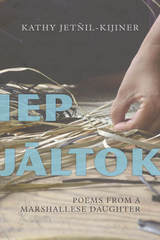
As the seas rise, the fight intensifies to save the Pacific Ocean’s Marshall Islands from being devoured by the waters around them. At the same time, activists are raising their poetic voices against decades of colonialism, environmental destruction, and social injustice.
Marshallese poet and activist Kathy Jetnil-Kijiner’s writing highlights the traumas of colonialism, racism, forced migration, the legacy of American nuclear testing, and the impending threats of climate change. Bearing witness at the front lines of various activist movements inspires her work and has propelled her poetry onto international stages, where she has performed in front of audiences ranging from elementary school students to more than a hundred world leaders at the United Nations Climate Summit.
The poet connects us to Marshallese daily life and tradition, likening her poetry to a basket and its essential materials. Her cultural roots and her family provides the thick fiber, the structure of the basket. Her diasporic upbringing is the material which wraps around the fiber, an essential layer to the structure of her experiences. And her passion for justice and change, the passion which brings her to the front lines of activist movements—is the stitching that binds these two experiences together.
Iep Jāltok will make history as the first published book of poetry written by a Marshallese author, and it ushers in an important new voice for justice.
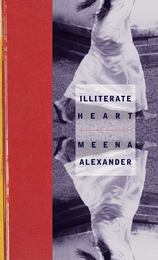
Recipient, 2008 Guggenheim Fellowship
Meena Alexander's poetry emerges as a consciousness moving between the worlds of memory and the present, enhanced by multiple languages. Her experience of exile is translated into the intimate exploration of her connections to both India and America. In one poem the thirteenth-century Persian poet Rumi visits with her while she speaks on the phone in her New York apartment, and in another she evokes fellow-poet Allen Ginsberg in the India she herself has left behind. Drawing on the fascinating images and languages of her dual life, Alexander deftly weaves together contradictory geographies, thoughts, and feelings.
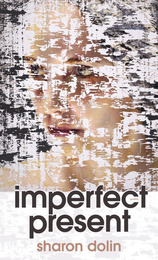
Imperfect Present is a book for our current moment. By confronting the urgencies of daily life, from questions of identity to sexual abuse to racial unrest to the ubiquity of plastic, these poems investigate ways to sustain ourselves in our fraught public and private lives. With her characteristic linguistic play, Sharon Dolin illuminates some of the most personal concerns that resonate throughout our culture and in ourselves, such as error, despair, uncertainty, and doubt. In sections that deploy the lens of art, the “Oblique Strategies” of Brian Eno and Peter Schmidt, and meditations on dreams and spirituality, Imperfect Present provides a panoply of approaches that grapple with the complexity of now.
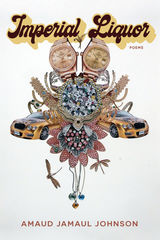
Imperial Liquor is a chronicle of melancholy, a reaction to the monotony of racism. These poems concern loneliness, fear, fatigue, rage, and love; they hold fatherhood held against the vulnerability of the black male body, aging, and urban decay. Part remembrance, part swan song for the Compton, California of the 1980s, Johnson examines the limitations of romance to heal broken relationships or rebuild a broken city. Slow Jams, red-lit rooms, cheap liquor, like seduction and betrayal—what’s more American? This book tracks echoes, rides the residue of music “after the love is gone.”
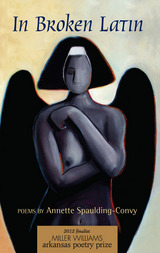

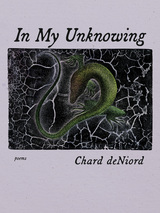
I WEPT WITH JOY ABOVE THE RIVER
I wept with joy above the river.
I wept with sorrow above the river.
My tears were clear, both sweet and bitter.
One leaf cried out to another,
“Empty me today of all my color.
Fill me tomorrow with a shot of sugar.”
This was the still ritual for my feet:
To stand on the earth that took of earth earth with ill and sing.
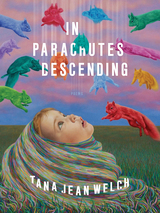
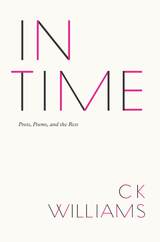

The earliest known author of written literature was a woman named Enheduanna, who lived in ancient Mesopotamia around 2300 BCE. High Priestess to the moon god Nanna, Enheduanna came to venerate the goddess Inanna above all gods in the Sumerian pantheon. The hymns she wrote to Inanna constitute the earliest written portrayal of an ancient goddess. In their celebration of Enheduanna's relationship with Inanna, they also represent the first existing account of an individual's consciousness of her inner life.
This book provides the complete texts of Enheduanna's hymns to Inanna, skillfully and beautifully rendered by Betty De Shong Meador, who also discusses how the poems reflect Enheduanna's own spiritual and psychological liberation from being an obedient daughter in the shadow of her ruler father. Meador frames the poems with background information on the religious and cultural systems of ancient Mesopotamia and the known facts of Enheduanna's life. With this information, she explores the role of Inanna as the archetypal feminine, the first goddess who encompasses both the celestial and the earthly and shows forth the full scope of women's potential.
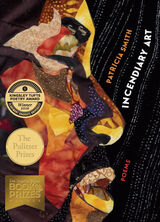
Winner, 2017 Los Angeles Times Book Prize
Finalist, 2018 Pulitzer Prize for Poetry
Winner, NAACP Image Award for Outstanding Literary Work in the Poetry category
Winner, 2018 Kingsley Tufts Poetry Award
Winner, 2018 BCALA Best Poetry Award
Winner, Abel Meeropol Award for Social Justice
Finalist, Neustadt International Prize for Literature
Winner, 2021 Ruth Lilly Poetry Prize
One of the most magnetic and esteemed poets in today’s literary landscape, Patricia Smith fearlessly confronts the tyranny against the black male body and the tenacious grief of mothers in her compelling new collection, Incendiary Art. She writes an exhaustive lament for mothers of the "dark magicians," and revisits the devastating murder of Emmett Till. These dynamic sequences serve as a backdrop for present-day racial calamities and calls for resistance. Smith embraces elaborate and eloquent language— "her gorgeous fallen son a horrid hidden / rot. Her tiny hand starts crushing roses—one by one / by one she wrecks the casket’s spray. It’s how she / mourns—a mother, still, despite the roar of thorns"— as she sharpens her unerring focus on incidents of national mayhem and mourning. Smith envisions, reenvisions, and ultimately reinvents the role of witness with an incendiary fusion of forms, including prose poems, ghazals, sestinas, and sonnets. With poems impossible to turn away from, one of America’s most electrifying writers reveals what is frightening, and what is revelatory, about history.
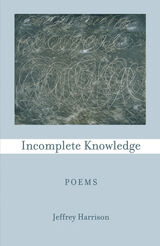

In one of the poems in Instructions for Folding, Willie Lin writes, “it seemed you were away but not beyond language.” And accordingly, the voice in these poems is sometimes fervid, sometimes wry, moved to speech by the specific desire to speak to someone. The poems often progress associatively, following a kind of lyric logic of involution, disruption, and juxtaposition. They rehearse the work of learning the heft and shape of memories. They revel in failures and take pleasure in mourning. They bristle with narrative suggestiveness, weaving an austere music against a scrim of love, loneliness, secrets, and elation.
.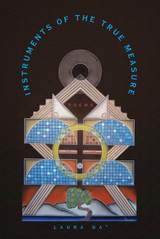
Surveying and geography underpin the collection, but even as Da’ investigates these signifiers of measurement, she pushes the reader to interrogate their function within the stark atrocities of American history. Da’ laments this harsh dichotomy, observing that America’s mathematical point of beginning is located in the heart of her tribe’s homeland: “I do not have the Shawnee words to describe this place; the notation that is available to me is 40°38´32.61´´ N 80°31´9.76´´ W.”
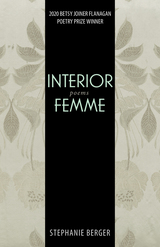
At the center of the book is Mnemosyne, goddess of memory and mother of the nine muses, who is crumbling under the terrific burden of remembering. In these poems, there is a woman critically wounded—representing the totality of the Western feminine imaginary—who is seeking answers to dire questions. Lyrically complex, sometimes surreal, and often ekphrastic in style and content, Interior Femme simultaneously offers heartbreak, laughter, comfort, and empowerment.
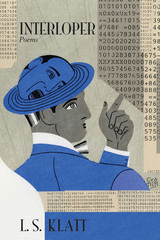
The poems in Interloper unsettle frontiers between disparate worlds so that the imagination is given room to roam: pears become guitars, racks of ribs are presented as steamboats, and helicopters transmute into diesel seraphs. The poetry aspires acrobatically in the manner of prayers and pilots, but adventure throughout the book is viewed as precarious and the will to conquest leads to apocalypse and ruin. The interloper wanders through crime scenes and crash sites as he glosses the landscape—at home and not at home with the America of yesterday and tomorrow. In symbols that scat and ricochet, the interloper scores a new song, one that composes—and decomposes—on the page.
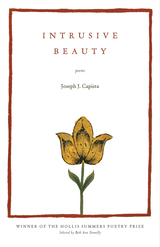
Winner of the 2018 Hollis Summers Poetry Prize
Joseph J. Capista’s Intrusive Beauty reckons with reluctant ecstasy and the improbable forms that beauty assumes. In this powerful debut, Capista traverses earth and ether to yield poems that elucidate the space between one’s life and one’s livelihood. While its landscapes range from back-alley Baltimore to the Bitterroot Valley, this book remains close to unbidden beauty and its capacity to sway one’s vision of the world. Whether a young father who won’t lower the volume on the radio or a Victorian farm boy tasked with scaring birds from seed-sown furrows, the inhabitants of Intrusive Beauty are witness to the startling ease with which one’s assorted lives come in time to comprise a singular life. Mortality, love, duty, desire, an acute longing for transcendence: here, old themes resound anew as they’re uttered in a multiplicity of forms and means, holding fast always to the heart.
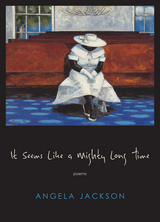
2015 PEN Open Book Award Finalist
Angela Jackson’s latest collection of poetry borrows its title from a lyric in Barbara Lewis’s 1963 hit single “Hello Stranger,” recorded at Chess Records in Chicago. Like the song, Jackson’s poems are a melodic ode to the African American experience, informed by both individual lives and community history, from the arrival of the first African slave in Virginia in 1619 to post-Obama America.
It Seems Like a Mighty Long Time reflects the maturity of Jackson’s poetic vision. The Great Migration, the American South, and Chicago all serve as signposts, but it is the complexity of individual lives—both her own and those who have gone before, walk beside, and come after—that invigorate this collection. Upon surveying so vast a landscape, Jackson finds that sorrow meets delight, and joy lifts up anger and despair. And for all this time, love is the agent, the wise and just rule and guide.
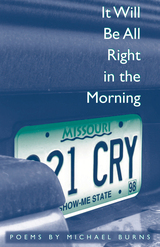
In his plain-spoken lyrics and dramatic monologues, Michael Burns digs at the marrow. His poems—in formal and free verse—are quick, incisive, and always capable of revealing the dark whimsies of fate and the pain of our own actions and inactions.
These poems travel to Casqui mounds in the Arkansas Delta, traffic-clogged urban streets, a wasteland in Oklahoma, and Faulkner’s Rowan Oak. They assume the voices of others so convincingly that we find ourselves face to face with hunters, philanderers, husbands, a Union general, a Snopes, and even a version of God.
Gathering the images of each place, crafting lines in clear, unpretentious language, Burns comes across new knowledge, confronting the ever-present mysteries and the ways the mind loves to lie to itself.
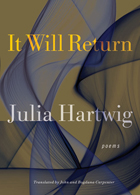
In It Will Return, her most recent volume of poems, Julia Hartwig is in dialogue with other great artists—Keats, Rimbaud, Milosz, Beethoven, Ravel, Van Gogh—considering the implications of greatness. Alongside this expansive perspective, we find attention to the smallest details, composing quotidian moments that open out into unexpected meaning. For Hartwig, close attention to the material world is a kind of spiritual undertaking. Like her Nobel Prize–winning contemporary Wislawa Szymborska, she writes poems that appear simple but are somehow all the more capable of yielding profound insights.
It Will Return reflects Hartwig’s firsthand involvement in Polish history and culture, and its poems are sensitive to the calamities of Poland’s tumultuous twentieth century. But It Will Return is a human collection before it is a national one, and these political motifs form the backdrop for more universal dramas.
READERS
Browse our collection.
PUBLISHERS
See BiblioVault's publisher services.
STUDENT SERVICES
Files for college accessibility offices.
UChicago Accessibility Resources
home | accessibility | search | about | contact us
BiblioVault ® 2001 - 2024
The University of Chicago Press









